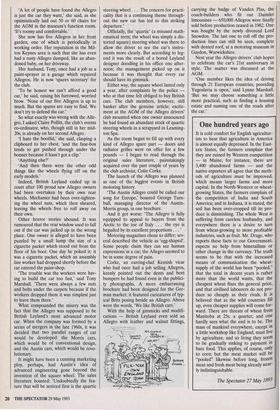One hundred years ago
It is cold comfort for English agricultur- ists to hear that agriculture in America is almost equally depressed. In the East- ern States, the farmers complain that they are ruined by Western competition — in Maine, for instance, there are 3,400 abandoned farms — and the native reporters all agree that the meth- ods of agriculture must be improved, which means larger farms and more capital. In the North-Western or wheat- growing States, the farmers complain of the competition of India and South America; and in Indiana, it is stated, the soil has been over-cropped till its pro- duce is diminishing. The whole West is suffering from careless husbandry, and everywhere there is a desire to turn from wheat-growing to more profitable industries, such as fruit. Mr. Drage, who reports these facts to our Government, expects no help from bimetallism or other change in the currency. The truth seems to be that with the increased means of communication the wheat- supply of the world has been "pooled," that the total in decent years is rather more than the world wants, that the cheapest wheat fixes the general price, and that civilised labourers do not pro- duce so cheaply as their rivals. It is believed that as the wild countries fill up, even cheaper supplies will come for- ward. There are threats of wheat from Manitoba at 25s. a quarter; and one hardly sees what the end is to be. The mass of mankind everywhere, except in a little workshop like England, must live by agriculture, and so living they seem to be gradually sinking to payment in bare food. This applies, of course, only to corn; but the meat market will be "pooled" likewise before long, frozen meat and fresh meat being already near- ly indistinguishable.
The Spectator 27 May 1893


















































 Previous page
Previous page